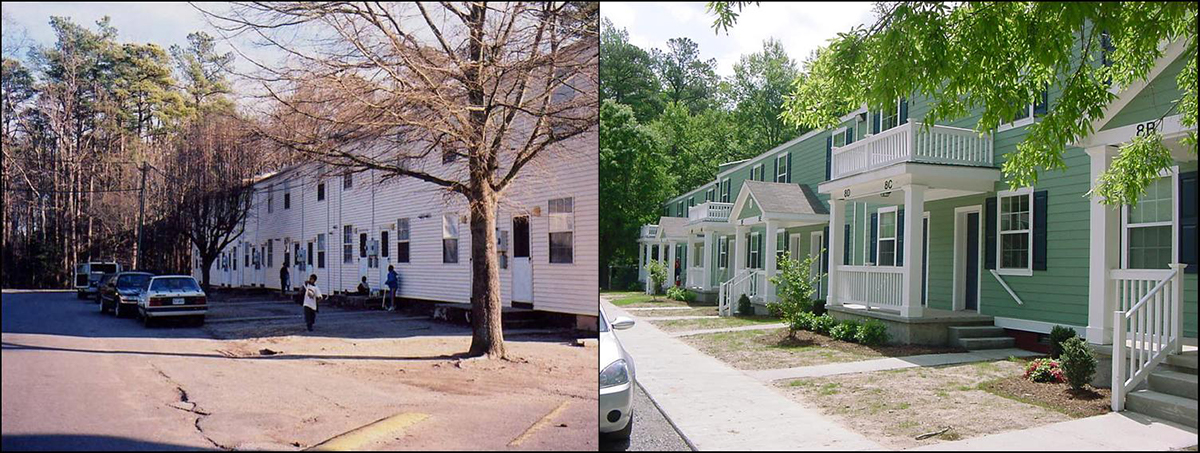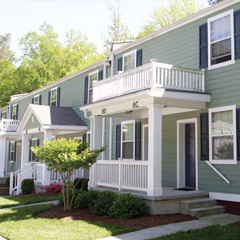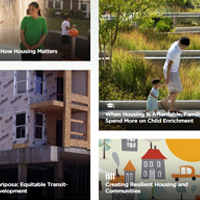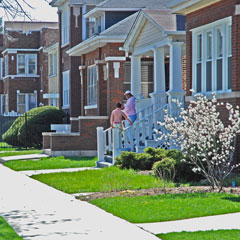
Summary
From 1999 to 2019, we made 565 grants and program-related investments totaling nearly $347 million.
With grants and program-related investments totaling $347 million, MacArthur pursued a goal of access to stable, decent homes for the greatest number of low- and moderate-income American families through more balanced national, state, and local housing policy that highlighted the importance of affordable rental housing in addition to homeownership.
Access to affordable housing is essential to strong, vibrant families and communities. But our nation has struggled with a declining stock of affordable rental housing due to conversion of units to market rental rates as well as condominiums. Compounding the issue, the pace of newly constructed replacement housing falls short of demand. This undersupply affects low-income households hardest: as of 2017, 80 percent of these renters pay more than a third of their incomes for rent, leaving less for food, healthcare, and education. Moderate- and middle-income households increasingly face a similar burden. Research demonstrates that having a decent, stable, affordable home provides more than shelter. It provides important benefits for children’s socio-emotional development and well-being, has profound health affects for people of all ages, and provides an important platform for economic success.

Before and after improvements of affordable housing units as part of the Windows of Opportunity initiative.
History of the Program
Beginning 1999 and across a range of initiatives, the Foundation invested $347 million in grants and program-related investments with the simple goal of improving access to decent, stable, affordable rental housing for low- and moderate-income families.
Through the Window of Opportunity: Preserving Affordable Rental Housing Initiative, the Foundation’s support for organizations engaged in the preservation of affordable rental housing and helped create important policy and financing innovations that have made it easier for developers to preserve rental housing in Chicago and nationwide. MacArthur invested $182 million to support housing preservation efforts over the last 20 years. Program-related investments were made to 20 nonprofit housing developers and 18 financial intermediaries and special purpose financing funds that supported rental housing preservation.
In the wake of the foreclosure crisis in 2007, the Foundation launched the Bipartisan Policy Center’s Housing Commission to develop sensible, actionable policy solutions to address near- and long-term challenges and create opportunities to meet the next generation of housing needs. Society will continue to see dramatic demographic shifts in the coming decades as the share of the population over 65 grows, as family structure changes, and as income stability and growth is less certain. The Commission’s report, Housing America’s Future: New Directions for National Policy, demonstrated bipartisan support for a comprehensive reform agenda.
Our support for research through the How Housing Matters to Families and Communities research initiative informed and shifted the dialogue related to housing policy. It used two main strategies: an interdisciplinary research network and a competitive research program that awarded $17 million to 34 projects. The research initiative expanded the lens on the importance of housing by highlighting the ways in which improving quality, affordability, and stability is about more than just a roof over one’s head. We and our grantees engaged leaders in housing, education, health, and economic development to identify ways to meet the housing needs of families and individuals who are unstably housed or burdened by housing costs. Better coordination between housing and other sectors and disciplines, and programmatic integration and policy alignment can improve educational achievement, enhance health and well-being, and provide a springboard to economic opportunity.
Why We Support This Work
In addition to these strategies, we made some targeted investments to help stabilize communities and homeowners in the wake of the foreclosure crisis. As a one-time-intervention amid the foreclosure crisis, we supported the Plan for Transformation by providing a program-related investment to the City of Chicago to support the development of four new mixed-income communities. We also supported an extensive body of research around the public housing transformation in Chicago as part of our early commitments.
Our Work’s Legacy
The housing program entered a legacy phase in 2017, with the goal of ensuring that research findings, financial innovations, and a strengthened field of practice would pave the way for a next generation of housing policy reform and a broader base of stakeholders and funders. In this phase, we aimed to secure a prominent place for rental housing on national, state, and local policy agendas. We supported efforts to build momentum for the next generation of housing policy, informed by Foundation-supported research that demonstrates the critical value of housing in people’s lives.
Formal grantmaking concluded in 2017, with some grants and program-related investments remaining in force through 2020 and beyond. We closed out our commitment to Housing with the Foundations for the Future of Housing Conference in Chicago, passing the baton to other leaders in the field. We continue our commitment to address some related underlying challenges through our other programs, including Impact Investments and Chicago Commitment, among others.
Grantmaking Highlights

Tackling Foreclosure In Chicago
October 23, 2018
Preserving Affordable Rental Housing
September 11, 2018
Studies Examine Most Effective Ways to Discuss Affordable Housing
September 20, 2016
Website Explores Housing's Connections to Economy, Education, and Health
February 19, 2015
Housing: Why Educators, Health Professionals, and Those Focused on Economic Mobility Should Care About It
November 16, 2017


